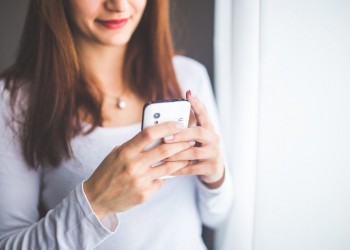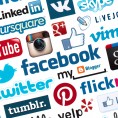Chances are, you and your business are super connected. Whether you and your colleagues are packing smartphones, tablets, mobile devices, computers (or, let’s face it—all at once), we’re constantly attached to high-tech devices. Our bestselling book, The Business Etiquette Bible, explains how to best utilize these high-tech tools to drive sales and interest, and how to more effectively make them a positive part of professional life – a topic we’ll explore further here.
Mobile devices have truly taken off over the past few years, and more than ever, businesses are electronically connected and wired. Amazingly, in 2011, CTIA found that there were now more cell phones (about 328 million) than people (about 315 million) in the US, and some people even have two phones, one for personal and one for business! The average smartphone allows employees to access email, text colleagues, download documents, research projects, take and share photos, conduct virtual meetings and more. As a result, maintaining proper mobile etiquette for business is more important than ever.
General Tips
- When to Use Phones and Mobile Devices
- Devices should be turned off during meetings, presentations, training sessions, meals, and conversations. They should also be shut down when entering conferences, restaurants, and religious institutions, or attending professional functions. As a rule of thumb, devices should be put away and silenced at any time they might disturb others, i.e. when in shared company.
- If you must keep your phone on because you’re expecting an important message or communication, silence it or set the ringer to vibrate. Under optimal scenarios, calls will be forwarded to voicemail, where you can listen and respond to them later.
- If you cannot avoid having to take a call or text, politely excuse yourself from the scenario or discussion, as you would when going to the bathroom.
- Whether in public or private spaces, always keep conversation levels to a respectful volume. Shouting into your phone is inappropriate.
- If unavoidable, calls made in public should be kept as short, sweet and quiet as possible, and confined to crowded or noisier areas where less private space is anticipated.
- Note that should you choose to interrupt exchanges to take calls, the longer you keep other parties waiting, the greater their potential annoyance.
- When speaking in public spaces, avoid sharing private information, as it may be overhead and subsequently shared with others.
- Do not turn phones on during public performances, business meetings, and other shared moments that could disturb individuals or large groups of people.
- Phones should not be used in enclosed spaces such as elevators, restaurants and other places where your conversations may intrude upon or annoy others. If you need to make a call, politely excuse yourself and step outside to do so, or wait until you’re in a less private or intrusive setting.
- If placed on vibrate, note that phones should be stored in a purse or pocket, so as not to make noise when they shake against a hard surface, e.g. the dinner table, disturbing others with the sound of their vibrations.
- Ringtones may add character to incoming calls, but consider the message they send: Clients may not equate Justin Bieber’s falsetto with something they’d expect to hear emanating from the suit pocket of a serious professional.
- Texting or talking on your cell phone while driving may distract you, impair reaction times and endanger others, and should therefore be avoided at all costs. Hands-free wireless Bluetooth headsets may mitigate some issues, but the best solution is to pull over, park and finish conversations before resuming travel.
Everyday Advice and Hints
- Turn off phones’ displays when not in use to avoid accidentally dialing contacts.
- Shut down phones and other high-tech devices while in darkened conventional halls or meeting spaces, and don’t use them during such low-light scenarios – screens may light up and detract from fellow attendees’ enjoyment.
- Take caution when choosing contacts to email or dial – an accidental slip of the finger, or gaffe made by built-in auto-correction features, may result in your contacting the wrong party.
- Be courteous and timely about responding to calls, emails and texts – if it takes you longer than 24 hours to get back to the sender, you may want to send a brief note with an ETA when a proper response can be expected. (“Sincerest apologies, I’ve been busy at work, but I’ll do my best to get back to you within the next day or so.”)
- Should you accidentally receive a call or text intended for someone else, a simple “sorry, wrong number” will suffice to prevent further communication. Resist the temptation to be rude, snarky or annoyed when responding, and realize that ignoring the missive may result in subsequent attempts at communication.
- Bluetooth wireless earpieces and headsets should always be turned off and taken out when not in use, and are inappropriate to use while conversing with other. Similarly, they should not be used in enclosed spaces, where they may disturb others. Limited use in high-traffic or noisy public spaces may be acceptable – the same rules for using cell phones, as presented in When to Use Phones and Mobile Devices, apply.
Cameras and Video Cameras
- Do not photograph or record videos of others without their knowledge and permission.
- Do not take pictures or videos that would offend or embarrass subjects.
- Do not share and post snapshots or film clips of others without their approval.
- Do not use cameras and camcorders in private or intimate spaces including bathrooms, showers, locker rooms, dressing rooms or other spaces where doing so may violate personal privacy and/or the law.
- Do not use cameras and video cameras in houses of worship, during intimate personal or family occasions, or in group or shared settings that may jeopardize others’ privacy (i.e. wherever the expectation of privacy is enjoyed) or the privacy of their children (ex: your local daycare).
Texting and Messaging
- When abbreviating messages, show knowledge and respect of how the other party may interpret these communications – texts sent to your boss should look differently than texts sent to a 20-something customer, as each will comprehend and react to messages differently.
- Avoid texting private, embarrassing, intimate or confidential details, as these messages aren’t just inappropriate to send – they’re also all too easy to forward on and into the hands of unwanted parties.
- Note that slang, jargon, grammatical errors, and misspellings may save time and give messages a hint of character, but may reflect poorly upon you or send the wrong message about your personal communication skills. (One point, as alluded to above, is that much depends on the culture of the business you’re operating in. If you’re working at a cutting-edge technology startup, for instance, you might certainly have more latitude than, say, if you worked in a more traditionally conservative organization such as a bank or brokerage firm.)
- As with emails or any form of written high-tech communication, note that tone or intention may be hard to convey through texting, and messages may be perceived incorrectly or taken out of context. Consider before sending if the information is best conveyed with a phone call, short note or alternate form of communication.
- Double check names and numbers before texting, especially if making a confidential statement, lest you risk accidentally reach out to the wrong party.
- Show courtesy for others’ time, patience and phone bill by switching from group texts to reaching out to individuals via direct texts when the conversation becomes irrelevant to others, and ask that they reciprocate.
- Don’t send others text messages without asking first – not all subscribe to ongoing texting plans, and recipients may incur billing charges as a result.
- Text messaging is strictly casual in nature, and inappropriate for weightier or more meaningful communications. For more important news or interactions (ending a professional relationship, sharing unfortunate events, etc.) a phone call or in-person exchange is more appropriate.
- Texts should be kept brief – if you need to say more than can be fit into a few lines, write an email or pick up the phone instead.
- Avoid smiley faces, frowny faces or other imagery where possible, unless you enjoy a relaxed working relationship with the other party being communicated with, to avoid the appearance of unprofessionalism – such expressions are much more geared towards the exchange of casual and informal conversation.
- Be respectful of others and don’t carpet bomb them with texts – before sending, consider if they really need to receive your commentary in parts from the main body of the message.
- When texting people for the first time, or those who don’t have your name and number in their contacts listing or address books, be certain to introduce yourself and/or remind them of where you met. (“Hi, this is Scott, the business etiquette expert. For our chat at 11A about corporate training services, where would you like to connect?”)
- Sexting – the practice of sending sexually explicit material, including nude photos or lascivious references – is unacceptable and inappropriate under any circumstance. A major high-tech breach of conduct, it may also lead to embarrassment or prosecution, and should be taken seriously by any employer.
Borrowing a Device
- Do not use someone’s high-tech device without permission.
- If they have forgotten to do so, log them out of any social network, instant messenger, app or software program before you use it yourself.
- Getting permission to use a device does not give you the permission to snoop through other people’s personal files, accounts, software or media.
- Under no circumstance is it acceptable to read open emails that others have created, or look through their inboxes or sent messages.
- Avoid visiting any risqué, controversial, or potentially harmful (i.e. spam or fraudulent) websites while on another’s device.
- Ask permission before changing any device settings – even something as simple as WiFi connection point access – and restore everything back to the previous settings before returning the device.
- Do not change the lending party’s home page, or delete or install new software, without their express permission. If you are finished using installed software, uninstall it before returning possession of the device to the lender.
- Try not to borrow someone’s device if you’re nursing a cold, flu or other potential health condition that could spread germs and sickness. If you must do so, observe appropriate health precautions (using hand sanitizer, turning away to cough, wiping down the device with a disinfecting cloth, etc.) before, during and after usage.
- Resist the temptation to access graphic content or inappropriate websites; your colleague might not use his iPad only to access email while on a business trip… he also might use it to entertain his three year-old son at a restaurant!
- Do not delete files or close open programs, windows and documents without others’ permission. If you find closing a document to be unavoidable, be sure to save a version (e.g. “save as,” not just “save,” in the latter case potentially overwriting important data) before doing so.
- Some devices allow for multiple people to use separate user logins, such as Windows and Mac computers. Where such a feature exists, it’s appropriate to log out of any other person’s profile that is signed in and log back in with your own when using a shared device. That way, you have your own desktop, files and settings to work with.
- Clean up after yourself: If you have disturbed any items on someone’s desk, or used up supplies, be sure to pick up after yourself and replace missing items before handing access back over.
Sharing a Device
- Consider scheduling set times during which each user is allowed to use the device uninterrupted, and sticking to those times, to minimize conflict.
- Be respectful of others’ needs, and prioritize usage based on sensibility. If someone must perform an important task (producing a presentation on deadline, faxing a key contract, filing an important work report, etc.) it should take precedence over less time-sensitive pursuits.
- Do not open or look through others’ documents, files or multimedia without permission.
- Do not close others’ open windows, programs, apps or documents without first checking with them.
- Do not save files to folders designated for others’ private use.
- Do not delete others’ files, programs or contacts without receiving their permission.
- If you must close a document or program, save a version (e.g. “save as,” not just “save,” in the latter case potentially overwriting important data) and/or save open tabs and files before doing so.
- Log other users out of any social network, app or software program before you use it yourself.
- Do not visit risqué, controversial, or potentially harmful websites, including high-risk URLs that may present heightened security threats.
- Make others aware before changing any device settings or making permanent adjustments that may affect their computing experience.
- Do not change the lending party’s home page, or delete or install new software, without their express permission. If you are finished using installed software, uninstall it before returning possession of the device to the lender.
- Healthiness and cleanliness are essential: The same rules contained under Borrowing a Device apply here.
Breaking Negative High-Tech Habits
- If you must check your phone, tablet or mobile device regularly, decide on regular intervals at which this task will be performed (say, every half hour or hour) as opposed to obsessively checking the device every ten seconds.
- Be aware of certain activities that do not require your device to be turned on, or during which usage is discouraged, and enjoy being disconnected for that moment.
- Schedule at least one day a month where you do not turn on your devices or, at the very least, leave them off for the majority of the day.
- Avoid interrupting interactions with others to send texts, make calls or reference mobile devices.
- Turn away from the computer or cell phone when others address you, and maintain ongoing attention and eye contact during conversations.
- Experts recommend shutting off all devices a minimum of one hour prior to bedtime in order to improve chances of enjoying restful sleep.
For more, don’t forget to check out The Business Etiquette Bible!













